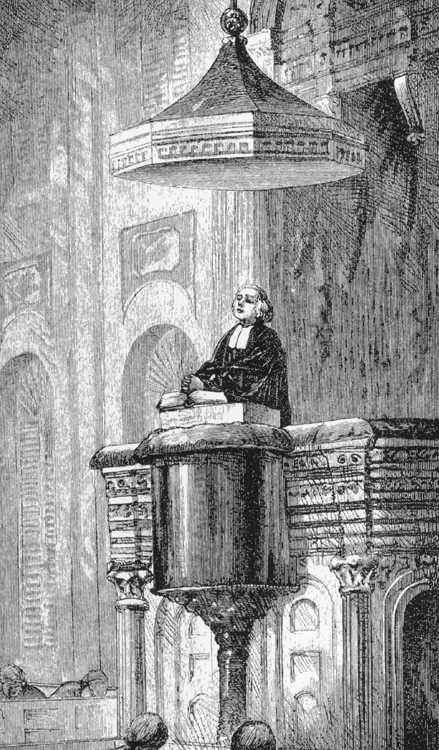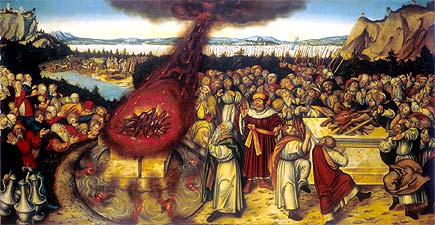I once attended a class on preaching and the teacher discussed the use of outlines versus spontaneity in  preaching. Some traditions suggest that, when a person is studied up and filled with the Spirit, they should be able to take the pulpit and speak impromptu and inspired. In other words, the measure of a preacher’s spiritually is if he can preach extemporaneously, without notes. On the other hand are those who spend considerable amount of time crafting a logical outline, gathering illustrations and rehearsing their material. Like Elijah (I Kings 18), who built an altar, cut up wood, offered a sacrifice, arranged the parts and prayed for fire from heaven, these ministers believe God honors order.
preaching. Some traditions suggest that, when a person is studied up and filled with the Spirit, they should be able to take the pulpit and speak impromptu and inspired. In other words, the measure of a preacher’s spiritually is if he can preach extemporaneously, without notes. On the other hand are those who spend considerable amount of time crafting a logical outline, gathering illustrations and rehearsing their material. Like Elijah (I Kings 18), who built an altar, cut up wood, offered a sacrifice, arranged the parts and prayed for fire from heaven, these ministers believe God honors order.
These two camps often butt heads: the former accusing the latter of unbelief and over-reliance on the flesh and the mind, the other suggesting that the bent toward spontaneity is presumption and intellectual sloth. I’ve landed somewhere in the middle. Good preaching is both a.) Having a tight outline and b.) Having an ability to “go with the flow.” In other words, a balance of CONTROL and FLEXIBILITY.
Two similar camps exist among writers. On the one hand are SOTP’s — Seat of the Pants writers; folks who allow the story to come to them and do not spend much time plotting. These are the Spirit-led  contingent. On the other hand are P&P’s — Plotters and Planners; folks who detail out a story BEFORE they put pen to paper. These are, for lack of better words, the control freaks.
contingent. On the other hand are P&P’s — Plotters and Planners; folks who detail out a story BEFORE they put pen to paper. These are, for lack of better words, the control freaks.
Let me state up front: When it comes to writing, I am a control freak. If there is one type of writer I misunderstand, it’s SOTP’s. How can you just start writing? Without direction? Or resolution? I’m sorry but I’m not going devote tens of thousands of words to a story without an end in sight. So, like I view the Spirit-led preacher, I see this writer’s “spontaneity” as “presumption and intellectual sloth.”
Of course, there’s some darned good SOTP’ers. Have you heard of Stephen King? In his book On Writing, he adds this to the debate:
I distrust plot for two reasons: first, because our lives are largely plotless, even when we add in all our reasonable precautions and careful planning; and second, because I believe plotting and the spontaneity of real creation aren’t compatible. It’s best that I be as clear about this as I can — I want you to understand that my basic belief about the making of stories is that they pretty much make themselves.
Forget that King believes our lives are “plotless.” I think Jesus would dispute that. Nevertheless, King’s suggestion that “plotting” and “the spontaneity of real creation aren’t compatible,” is interesting. It’s like the Spirit-led preacher accusing the Outline-preacher of inspirational impotence, as if “winging it” is the surest sign of spirituality. If this were true, however, Elijah wasted his time organizing the altar.
 But is “plotting” and “real creation” really incompatible? Is originality only the domain of the non-plotter? Fire descended from heaven AFTER Elijah built and organized the altar. Could it be that God inspired the building just as He can inspire the plotting. Isn’t it possible that the Holy Spirit can enkindle a preacher’s notes as well as his delivery? Is “real creation” only forged by the seat of one’s pants?
But is “plotting” and “real creation” really incompatible? Is originality only the domain of the non-plotter? Fire descended from heaven AFTER Elijah built and organized the altar. Could it be that God inspired the building just as He can inspire the plotting. Isn’t it possible that the Holy Spirit can enkindle a preacher’s notes as well as his delivery? Is “real creation” only forged by the seat of one’s pants?
I’m guessing God had a plan BEFORE He started flinging planets into space. Call me a control freak, but before I start my novel journey, I want a map of my destination. Either way, I’m wondering about a third category. Forget the SOTP’ers and P&P’ers, I’m beginning to feel like an SIB’er.
More. . .














I’m an SOTP, but I’m not married to it. I don’t see it as two competing camps. I’d like to believe it’s simply personality.
I never took notes or studied and I was an honor roll student. I don’t outline on paper. I outline in my mind. My point is that even SOTP’s are doing mental outlining. Even King starts out with an idea, probably a mental image of a loose plot with a desired ending. He just doesn’t lock himself in.
This is probably the same reason I have trouble coming up with topics for a post and you don’t. The few times I preach, it is only with a vague idea. I don’t or would never criticize those who like to prepare and outline. Sometimes, I even envy them. But, I have the ability to run with a topic without any preparation or outline. (The only drawback is that I have to rely on memory alone for supporting facts. Not always good.)
Apparently, at least those who have read my stuff think so, I can do the same thing with writing.
I have no problem with a preacher who carefully and methodically prepares his sermon. As long as he doesn’t fake the emotion. You know, have a line in his outline that says “start crying here” or “pause for emotional effect here” or “wipe brow and look introspectively at the cross here”
I think we have bigger problems facing Christianity than how our preachers prepare their sermons.
If I’ve learned anything in my walk with Jesus, it’s not to expect people to be like me in that same endeavor. God is too creative.
It’s the same with writing. I, too, am a SOTP writer, but there’s a rough plot in my mind. It’s only fleshed out as I write, but then that’s the design God has for me. Probably, since I was one of those students who did the term paper the night before it was due until 4 AM, the Lord knows I won’t sit down and write if I have all the information in my head. I’ll keep putting it off until whatever the “last minute” is.
In fact, the Lord spoke these words to me as I was laboring over my first novel which took me 8 and 1/2 years to complete. “If you pick up the pen, I’ll give you the words.” (It was written in long hand.) I put it on my business card.
Mike, as I was reading your post, I was arriving at your same conclusion. The plotting is PART of the creative process.
I’m a middle-of-the-roader, what James Bell calls a Headlighter. I plot the beginning to the end loosely, so I know where I’m starting and where I want to get to. Then I plot the first leg of the journey in some detail. When I get to that point, if I do, because sometimes there’s a detour, then I plot the next leg of the journey in detail
The idea of writing 10,000 words that I may later toss because it never went anywhere or because it doesn’t fit in with the preceding and following 10,000, just flat out discourages me. Writing is far too hard for me to think I can squander the effort. So I need an outline.
I learned with my first novel that the outline had to change from time to time, and some of those changes affected the whole story. So this method really works best for me.
Becky